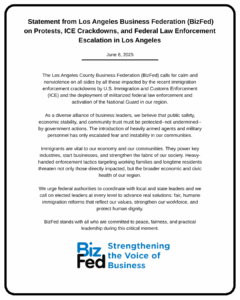Friday, February 3, 2017
Opinion Editorial
Tracy Hernandez, Founding CEO BizFed
In May of last year, financial advice website WalletHub released a study gauging diversity among U.S. cities.
The study examined several measures including racial, economic, household, and social class. Los Angeles came in at a respectable No. 12 among the nation’s 313 largest cities. Our No. 12 ranking puts us behind five California cities: Oakland (3), San Jose (7), Anaheim (9), Sacramento (10) and San Diego (11). Given that diversity benefits both our communities and our businesses, I believe we should aspire to do even better.
A passive approach to diversity could lead to cultural resentment, artificially constrained employment, fewer opportunities for advancement for all of our citizenry, and economic stagnation. Diverse communities contribute to a rich, culturally vibrant society and are an invaluable regional asset. Diversity is also good for business. Professionals from varying backgrounds, genders, and races bring different information, opinions, and perspectives resulting in fresh ideas as well as improved products and services. In fact, a 2015 study of public companies by management consulting firm McKinsey says those in the top quartile for ethnic and racial diversity in management were 35 percent more likely to have financial returns above their industry mean. Those in the top quartile for gender diversity were 15 percent more likely to have returns above the industry mean.
Our local policymakers, working alongside business, should be aggressive, starting with three initiatives to propel Los Angeles to the No. 1 spot and realize the “diversity dividend”: California should double down on career training programs that increase job opportunities. For example, the Los Angeles Community College District serves an incredibly diverse student population. The district has put to good use funding from the California Department of Education’s Career Pathways Trust grants.
Blending academic and career technical education, the program connects employers with schools and trains students for jobs in high-demand fields such as information technology, advanced manufacturing, health care, and software. Young people from diverse backgrounds, whose best prospects were low-skill jobs prone to be replaced by automation and algorithms, are now qualified for skills-based careers with higher wage potential and upward career mobility.
Global outreach
Los Angeles should also seek to vastly expand its international trade base, which encourages diversity. As we have seen from established agreements such as the Central American Free Trade Agreement, Caribbean Basin Initiative, Panama-U.S. Trade Promotion Agreement, Colombian Trade Agreement and the U.S.-Korea Free Trade Agreement, robust international commerce creates new and better economic opportunities by opening markets, eliminating tariffs, reducing barriers to services, and boosting business revenues.
Another benefit of trade is increased travel and tourism and greater cultural understanding. The L.A. business community needs to organize and argue for preserving NAFTA and revisit a broad trade approach with Asia (in place of the Trans-Pacific Partnership). With the election behind us, California representatives in Washington need to advocate more aggressively for international trade agreements that benefit the state and Los Angeles.
To further encourage diversity, policymakers also need to work with the business community to develop a comprehensive affordable housing approach for Los Angeles and the state. Los Angeles is becoming too expensive for many individuals and families. Research from the Urban Institute notes, “Housing affordability challenges contribute to the persistence of racial and ethnic exclusion in many metropolitan regions.” This year, the Los Angeles County Business Federation, or BizFed, will create a task force that aims to address California’s outdated Environmental Quality Act and L.A.’s anti-development Neighborhood Integrity Initiative (Measure S), which will put a two-year moratorium on most major developments and prevent the city from deviating from zoning rules. We invite policymakers at the city and state levels to join us in finding solutions that comprehensively and pragmatically create a system providing affordable housing for all communities.
BizFed is taking an active role in addressing diversity by adding roles and increasing responsibility for members of our diverse board. Board members come from all parts of Los Angeles County and represent concerns that impact all facets of our community. In fact, minority, women, and LGBT leaders comprise 62 percent of BizFed’s incoming 2017 board officer class. Collectively, we seek to shape the tone of advocacy on behalf of the business community.
Los Angeles is a global city doing business around the world. By promoting a community and business culture of diversity, we will better meet the needs of our business partners at home and in the international marketplace. We also bring the diversity dividend to an even larger circle of civic and business interests, which benefits everyone.
Tracy Hernandez is chief executive of the Los Angeles County Business Federation, BizFed.

